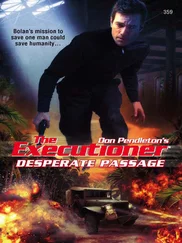Итан Рарик - Desperate Passage
Здесь есть возможность читать онлайн «Итан Рарик - Desperate Passage» весь текст электронной книги совершенно бесплатно (целиком полную версию без сокращений). В некоторых случаях можно слушать аудио, скачать через торрент в формате fb2 и присутствует краткое содержание. Жанр: Путешествия и география, на английском языке. Описание произведения, (предисловие) а так же отзывы посетителей доступны на портале библиотеки ЛибКат.
- Название:Desperate Passage
- Автор:
- Жанр:
- Год:неизвестен
- ISBN:нет данных
- Рейтинг книги:4 / 5. Голосов: 1
-
Избранное:Добавить в избранное
- Отзывы:
-
Ваша оценка:
- 80
- 1
- 2
- 3
- 4
- 5
Desperate Passage: краткое содержание, описание и аннотация
Предлагаем к чтению аннотацию, описание, краткое содержание или предисловие (зависит от того, что написал сам автор книги «Desperate Passage»). Если вы не нашли необходимую информацию о книге — напишите в комментариях, мы постараемся отыскать её.
Desperate Passage — читать онлайн бесплатно полную книгу (весь текст) целиком
Ниже представлен текст книги, разбитый по страницам. Система сохранения места последней прочитанной страницы, позволяет с удобством читать онлайн бесплатно книгу «Desperate Passage», без необходимости каждый раз заново искать на чём Вы остановились. Поставьте закладку, и сможете в любой момент перейти на страницу, на которой закончили чтение.
Интервал:
Закладка:
When Bryant arrived, Lansford Hastings was there, touting his new course. But so too was the legendary Joseph Walker, a mountain man with decades of experience in the west. Walker "spoke discouragingly" of the Hastings route, Bryant wrote.
Nonetheless, Bryant and his friends resolved to risk the new path. The whole trip west was a risky venture, and the timid were still on the farm, a thousand miles back and probably regretting the missed opportunity.
But Bryant also worried about the families farther back on the trail, the ones with which he had begun the journey. With their ponderous ox-drawn wagons, they should try no new and untested routes. At their slower pace, they would spend longer in the desert. With their livestock, they required more water and feed. And then there were the children. Family men should stick to the proven and rutted road. "Our situation was different than theirs," Bryant recalled. Single men on mules "could afford to hazard experiments, and make explorations. They could not."
Bryant could not wait around at Fort Bridger to voice his reservations in person. Even on the relatively fast mules, he still wanted to keep moving. Fortunately, an alternative was at hand. Louis Vasquez, who owned and operated the fort along with Jim Bridger, offered to see that letters were held for the oncoming wagons. Undoubtedly thankful for the kindness, Bryant scrawled out his doubts in messages to some of the key men, one addressed to James Reed. Then he rode off, trusting that the honorable men who ran Fort Bridger would see the missives safely delivered.
THE DONNER PARTY REACHED THE FORT nine days later, on July 27, a Monday, and pitched camp in a pleasing meadow half a mile downriver, hoping the rich valley grasses would rejuvenate their exhausted oxen. To let the animals rest, the emigrants planned to stay a few days.
As soon as the stock was turned loose and the bedrolls unpacked, the men went looking for Hastings. According to his own letter, he was supposed to be at the fort, waiting to guide them on his new and untested cut-off. It was crucial that they find him. Since Hastings's proposed route had hardly been traveled before, it bore none of the guide-posts that dotted heavily traveled trails—wagon tracks, well-worn fords, old campsites. Without Hastings, the Donner Party would be forced to feel their way along blindly, following a trail that did not really exist through terrain they did not know.
Yet Hastings was nowhere at the fort. He had gone ahead with other wagons. He had promised to wait for those who heeded his call, and now he had vanished. For Reed and the Donner brothers and the others of their company, it must have come as a brutal shock. They had banked their fate on an unreliable man.
Another option remained: the branch of trail leading northwest, toward Fort Hall. Take it, and soon enough they would be back in the ruts of the main route, perhaps even reunited with those to whom they had bid farewell at the Parting of the Ways. Clyman's knowledgeable warning about the Hastings Cut-Off argued for that option, and now so did Hastings's failure to wait for them.
One more stone might have tipped the scale, but the warning letters from Bryant lay as hidden as a miser's heart. Bridger and Vasquez had opened their fort just three years before, in 1843, as a trading post and way station for westward emigrants. The location seemed first-rate. Fort Laramie was well back to the east, on the other side of the Continental Divide; Fort Hall was still 150 miles away, at least a week's hard travel. Fort Bridger would do a booming business selling supplies and livestock to weary travelers. What's more, it was on the main road. The primary emigrant trail—the route that led to Fort Hall and then to Oregon and California—passed right by the new establishment.
But in a striking case of bad luck, Fort Bridger was bypassed the very next year. In 1844 a party of emigrants blazed what came to be known as the Greenwood Cut-Off, a shortcut that saved several days' travel but went nowhere near Fort Bridger. When emigrants steered to the right at the Parting of the Ways, it was actually the Greenwood Cut-Off they were taking. By 1846 the shortcut had become the main road, and almost nobody was going by way of Fort Bridger. Bridger and Vasquez found themselves stranded on a back road, like an old-fashioned motel too far from a new interstate.
Hastings's proposed route offered a solution. His cut-off required that emigrants use the old and now largely abandoned trail down to Fort Bridger before striking off through the Wasatch and along the southern edge of the Great Salt Lake. Unavoidably, families that took the Hastings Cut-Off would roll right past Bridger and Vasquez. So perfectly did the needs of Hastings and Bridger mesh that rumors of pay-offs circulated, although some of the gossip suggested that Hastings was paying Bridger and some that it was the other way around.
For Bridger and Vasquez, therefore, Bryant's discouraging letters were a potential disaster. If word got around that the cut-off was too dangerous for emigrants with wagons, families would continue to take the Greenwood route, never approaching Fort Bridger. Business would collapse.
The solution was as obvious as it was devious. When the Donner Party arrived, Bridger said not a word about the warning from Bryant, the emigrants' old traveling companion. Instead, he claimed the Hastings Cut-Off was a "fine level road." rich with grass for the livestock and well watered most of the way. The shortcut might save hundreds of miles over the old route via Fort Hall, he insisted. A benign explanation washed away Hastings's absence: The route he had initially explored contained a stretch without water, and now he had gone ahead to scout for an even easier trail.
Even without reading Bryant's letter, Reed and the other members of the Donner Party should have been suspicious of Bridger's enthusiasm. Anyone could see that the trading post was in danger of being marooned, an anachronism past which the modern trail detoured. Clyman had already offered cautionary words at Fort Laramie, and it's possible that at Fort Bridger the emigrants heard doubts yet again. Walker, the legendary mountain man who had warned Bryant about Hastings's route, may still have been there when the Donner Party arrived, telling people of his doubts. But if Reed heard of Walker's views, either directly or through local gossip, he seems to have disregarded them. Far from wondering about Bridger's possible motives in promoting the cut-off, Reed fell for the man. Bridger and Vasquez, he wrote, were "very excellent and accommodating gentlemen" who could be trusted to do business with emigrants "honorably and fairly."
So far as we know, no one else raised any strong objections, and so the wagons turned away from the tested trail to California. In less than two weeks, the Donner Party had faced essentially the same dilemma twice: Stay with the traditional route or take a chance on Hastings's promises. Both times they made the same decision. Sooner than they could imagine, they would have reason to wonder about the wisdom of their choice.
8
A New and Interesting Region
The young rider bounced off his mount and thudded sickeningly into the hard earth of Wyoming. The fall knocked Edward Breen out cold, and when he regained consciousness his left leg throbbed with pain. Adults arrived and examined the boy and found a bad break between the knee and ankle. There was no doctor in the company, but they were only a little ways beyond Fort Bridger. Perhaps someone there boasted medical training. A rider galloped off, and in time he returned with the nearest thing to a doctor the fort had to offer, "a rough looking man with long whiskers" who had probably acquired what medical knowledge he had through long experience on the frontier. He unrolled a small bundle he was carrying and produced a short saw and a long-bladed knife, obviously the tools of amputation.
Читать дальшеИнтервал:
Закладка:
Похожие книги на «Desperate Passage»
Представляем Вашему вниманию похожие книги на «Desperate Passage» списком для выбора. Мы отобрали схожую по названию и смыслу литературу в надежде предоставить читателям больше вариантов отыскать новые, интересные, ещё непрочитанные произведения.
Обсуждение, отзывы о книге «Desperate Passage» и просто собственные мнения читателей. Оставьте ваши комментарии, напишите, что Вы думаете о произведении, его смысле или главных героях. Укажите что конкретно понравилось, а что нет, и почему Вы так считаете.












